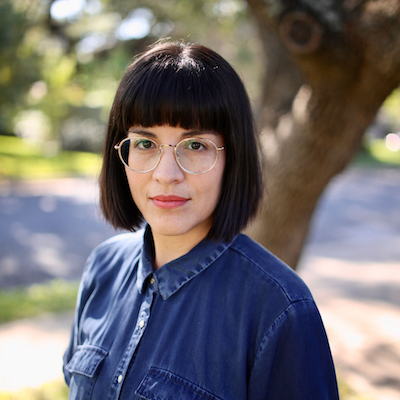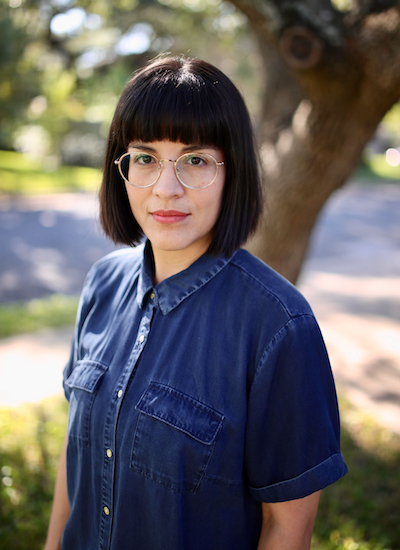
 For five years, Stephanie Macias has been reading and considering submissions to American Short Fiction, and she’s been instrumental in running our in-person events in Austin. A virtual Swiss Army Knife of artistic pursuits (she’s a writer, photographer, visual artist, musician, and editor), Stephanie is now set to bring her broad experience and enthusiasm for stories to a new role at American Short Fiction: that of managing editor.
For five years, Stephanie Macias has been reading and considering submissions to American Short Fiction, and she’s been instrumental in running our in-person events in Austin. A virtual Swiss Army Knife of artistic pursuits (she’s a writer, photographer, visual artist, musician, and editor), Stephanie is now set to bring her broad experience and enthusiasm for stories to a new role at American Short Fiction: that of managing editor.
As the outgoing managing editor, I’m both grateful for and proud of the work I’ve gotten to do during my tenure, and I’m excited about what the future of the magazine looks like with Stephanie’s hand firmly on the wheel. While I’m not going anywhere, really (I’m making the transition to senior editor, where I’ll focus on the print edition of the magazine rather than day-to-day operations), change is always hard. Happily, this particular change is much less difficult knowing that she’s stepping into this role. I recently had the opportunity to ask Stephanie about her own work, her approach to editing, and the general landscape of contemporary fiction. As you’ll see, she’s sharp as a tack, talented as all get-out, and exactly the right person to help lead ASF into the future.
— Nate Brown
—
Nate Brown: First, Stephanie, I’m delighted that you’re stepping up as our new managing editor. Can you tell us a bit about yourself?
Stephanie Macias: I’m a writer, musician, and artist, and I’ve been living in Austin, TX, since 2012. I write a lot, read a lot, draw and paint when I’m in the mood, was learning violin at one point and will continue at some point, received my bachelor’s degree in photography so if you see me out and about, chances are I have a camera somewhere on my person. I have a partner, which is cool, but here are the names of my three kitties: Bones, Nicholas, and Wolfgang.
NB: You’ve been on the ASF staff for a number of years and have seen a period of growth and change at the magazine. What are your short-term and longer-term aspirations for ASF?
SM: In the short term, I’d really like to see the magazine submissions increase (we want to read your work!) and the response time decrease. Now that you’re all laughing at me, I’ll say that in the long term, I’d like to see the magazine continue to think creatively about how to increase accessibility to its literary events and educational opportunities. I’m so proud to be a part of this organization and all it already does for the Austin community and beyond. I cannot wait to see how it grows in the coming years and can’t believe I get to be a part of it.
NB: I’ve felt similarly lucky to be a part of it, and I often find myself looking to other magazines I admire to remind myself of the role we play in presenting new work to a hungry readership. I find myself continually impressed by the quality of work in A Public Space and One Story, among others. I also love Oversound, an always-surprising poetry journal based in South Carolina. What lit mags are grabbing your attention these days?
SM: I am also inspired by A Public Space and One Story! The Iowa Review and The Paris Review both whip me up as well. I was excited when I first heard about No Tokens, a lit mag exclusively run by women, trans, queer, and non-binary individuals, and I feel beyond fortunate to have a story coming out in their next issue. (That’s not a plug, but it kind of is, isn’t it?) I also enjoy some genre magazines like Lady Churchill’s Rosebud Wristlet, which is operated completely by snail mail, and Lightspeed which is online only and reads submissions incredibly fast.
NB: What about your taste in short fiction? What’re you looking for in a great story and, by extension, a great submission to the magazine?
SM: In a great short story, I’m really looking to be moved. I think a few years ago I might have said something crafty, but now I find I want the story to affect me so much I recall it like a memory. In reading for the magazine, I’ve always tried to remain as open as possible. We all have our preferences, but I read submissions with a willingness to be opened up in whatever way the writer chooses.
NB: You recently graduated from the New Writers Project at the University of Texas at Austin. What was that experience like for you?
SM: It was one of the best experiences of my life. We’ve all heard horror stories about MFA programs, and so I entered prepared for at least some disappointment. What a surprise to find a deep community there, peers I’ll depend on for the rest of my writing life and professors who brought out the best in my work.
NB: What is your own work like? Do you have any writerly obsessions or interests that you return to in stories?
SM: When I was a singer-songwriter and people asked me what kind of music I played, I always died a little inside. This isn’t too different. JK! (Sort of.) I’d say I enjoy traversing speculative space, playing with form, and making myself laugh with absurdism. That being said, I’m always challenging myself, so nothing is ever off the table. I do find I keep coming back to characters during a time in their lives when they think they should have accomplished more than they have. A feeling of time lost, of trying to catch up, of having missed a boat. Maybe I know a little about it and that’s why.
NB: On the subject of your other artistic practices, I know that in addition to writing and performing music, you’re also a visual artist. Do these other mediums show up in or inform your writing?
SM: For a while, I wasn’t going to let them. Now I’m writing a novel about a musician who also illustrates some of the book. Go figure. Only recently have I written a short story about a musician, but it took quite a while to allow myself the challenge. I was a full-time musician for fifteen years, wrote songs and toured during that time. I think I just wanted my writing to feel like a separate world. Now I’m mixing it all up.
NB: Are there any similarities in writing a song and writing a story, or do they strike you as wholly separate endeavors? And, is one easier for you than the other?
SM: Writing a song is much like writing the first draft of a story. You’re following the thing through a dark forest, and at the end, you have a draft or a song. But songs can immediately be taken out to the gig that night and played for an audience who claps for the song, which tricks you into believing the song is good. Songs are so tied up in performance, it’s difficult to tell what they need.
I threw away songs like tissues, wrote more until I found the one that thrilled me more than the others. Stories take time. Stories evolve. Stories transform into completely different animals with barely a bone left from the original. It makes me wish I’d worked on my songs this way, but who can resist a ready audience who will congratulate you with their applause on the same day of creation?
NB: I’d like to also ask you about the broader landscape of fiction right now. Who are you reading? What are you loving? Any story writers out there who you particularly love right now?
SM: I just finished Hot Milk by Deborah Levy and enjoyed her startling declarative sentences! I also finished Brenda Peynado’s collection The Rock Eaters, and it was an absolute gift to see Latinx folks in the speculative space. Megan Kamalei Kakimoto’s collection Every Drop Is a Man’s Nightmare truly moved me. Full disclosure, we are friends, but even better to pop open a friend’s book and be so incredibly changed by it.
NB: Do you have any words of wisdom for artists, writers, musicians, and editors like yourself?
SM: For me, it’s all about the work. If the work becomes your source of joy, then the results can’t control your emotions for too long.
Formerly an assistant editor at the magazine, Stephanie Macias is American Short Fiction‘s new managing editor.
Nate Brown is American Short Fiction’s former managing editor and is currently a senior editor at the magazine.